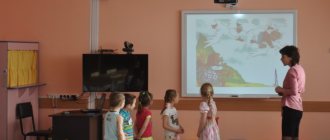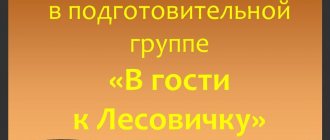Summary of educational activities for speech development “Journey to School”
Goal: developing the communicative competence of preschoolers.
Tasks:
1. Correctional - educational: - Expansion, clarification, updating of the dictionary on the topic “School supplies”. - Improving the grammatical structure of speech (inflection skills, word formation) 2. Correctional - developing: - Development of general and fine motor skills, coherent speech, thinking, imagination; - Development of spatial orientation: 3. Correctional - educational: - Nurture in children the skills of cooperation, a sense of responsibility, accuracy, initiative, independence. Equipment: school supplies, bell, laptop (with a recording of the song “What do they teach at school?”), ball, mnemonic diagrams (sound, letter), red circles, “diaries” on the board and for children (sheet with names of lessons) , counting sticks.
Progress of the lesson.
1. Organizational moment.
- Let's smile at each other and everyone will say hello to their neighbor, calling him by his affectionate name. - Having guessed the riddles, you will find out what we will talk about today.
- I look like a box, you put your hands in me. Schoolboy, do you recognize me? Well, of course, I -... (pencil case)
If you perfect it, you can draw whatever you want: the Sun, rivers, mountains, beach. What is this? (pencil)
Now I'm in a cage, now I'm in a line. Be able to write about them! you can also draw What am I... (Notebook)
If you give her a job, the pencil was in vain. (Rubber)
I’m ready to make the whole world - a house, a car, two cats. Today I am the ruler - I have... (Plasticine)
I'm big, I'm a student! In my backpack... (Diary)
There is a house: Whoever enters it will acquire intelligence. (School)
- Well done, guys, everyone guessed the riddles! Who guessed what awaits us today? — Would you like to be at school now? Now I will say the magic words and you will all turn into schoolchildren. Shall we try? Close your eyes. - Spin around, spin around, you’ll all turn into schoolchildren. That's it - now you are real students - first graders. And this is our class. It has desks, a blackboard and even a grade book. — What are the names of the children who study at school? (students) - Who teaches the children? (teacher). -I will be the teacher, and you will be my students. — We will have 5 lessons and for each lesson we will receive grades. Agreed?
The bell rings. Lesson 1 - literacy.
I will make different sounds, if you hear the sound A , clap your hands. (A, O, U, O, Y, A, O, U, I, Y, A, O) -And now let’s play the game “Traffic Controllers.” I will pronounce words, if you hear that a word begins with the sound A , raise the red circle. (Orange, house, onion, pineapple, Anya, varnish, bus) - The Evil Sound Eater ate the first sounds of A in words. You need to know these words. - Think of words that begin with the sound A. (children call in a chain). - Look at the diagram. We hear sounds with our ears and pronounce them with our mouths. (Ear-mouth diagram) - The sound A is denoted by the letter A. (A letter is set). (Eye-letter diagram) I suggest you write the letter A in the air, and now we will lay out the letter A from sticks. - The lesson is over. Well done! Let's put 5 in our diaries! (Children stick 5 in their “diary”, and the speech therapist is on the board)
Call. Physical education lesson.
F/minute:
One, two, three, one, two, three - (movement in a circle with a sporty step) We came to visit the school. We stand on our toes - (walking on our toes) And grow, grow, grow - arms (slowly raising our arms up) We stand up and squat - (children squat and stand up one by one) And we won’t get tired at all. We’ll grow up a little - (torso tilts left - right) We’ll be happy to go to school - (I keep walking in a circle).
- Well done. We give ourselves a 5 in physical education, the next lesson is mathematics.
In this lesson, you and I will count the school supplies that we cannot do without at school. (counting to 5 with the words pencil, pen) -And now I propose to play the game “One - Many.” Children, in a chain, take objects (school supplies) and say: “I have an eraser, but there are erasers in the store,” pencil - , pen - , album - ,
Well done! Now let's compare the objects: Game "On the contrary"
The pencil is short, and the ruler is .... (long) The notebook is thin, and the book is .... (thick) The eraser is small, and the pencil case ..... (large) The album is light, but the briefcase ... (heavy) The green pencil is sharp, and the blue ... (blunt)
-Now let's count the syllables in words (ruler, pencil, pen, chalk, plasticine). Which word is the longest, shortest? - The lesson is over. Well done! Let's put 5 in our diaries! (Children stick 5 in their “diary”, and the speech therapist is on the board)
Call. Turn.
the game “Big-small” with the ball .
I name a word - an object and throw a ball to one of you. The one who catches the ball calls it affectionately. Paints, pencil-, notebook-, book-, ruler-, pencil case-, brush-, eraser-, plasticine, paperclip-, button-.
The bell rings for class. The next lesson is natural history.
What do you think is being taught in this lesson? (children’s answers) The lesson will not be ordinary, we will solve tricky “Trick Riddles”
In winter, in a den, he dreams of a Shaggy, Clubfoot...elephant (bear)
The fastest one rushes out of fear... is the tortoise (hare)
Even a foreigner knows that everyone in the forest is more cunning than the hare (fox)
A simple question for kids: “Who is the cat afraid of?” ...mice (dogs)
The whole street heard the chicken (cow) mooing.
Game “Does this happen?”
Correct the mistakes.
Pupils go to school at night. You can take pajamas to school. The pencil case was put in Dasha’s briefcase. The primer is read by the student. Vova was cutting paper with scissors. - The lesson is over. Well done! Let's put 5 in our diaries! (Children stick 5 in their “diary”, and the speech therapist is on the board)
Music.
Children take comfortable positions (on the carpet). I suggest you listen carefully to the song called “What do they teach at school?” — What did you learn from the song about what they teach at school? (Children answer) - The lesson is over. Well done! Let's put 5 in our diaries! (The children stick 5 in their “diary”, and the speech therapist is on the board) - And now it’s time for us to go back to kindergarten. Let’s say our magic words: “Spin around, spin around, turn into a preschooler!” Here we are in the garden!
Lesson summary:
— Today we visited school. I want you to answer the question of whether you want to go to school and why. (The bell “goes” in a circle) Children pass the bell around in a circle and express their opinion:
-I want to go to school because... or - I don’t want to go to school because.....
-Very soon you will all go to school, where the first teacher will meet you. For you, she will be the smartest, most beautiful, kind and strict, caring, like a mother. I am sure that you will study only with an “A”!!
— To remember our trip, we will take a photo with our “diaries.” You will see the photo on the stand in your group. I will also give you colored pencils that you can use in your group to draw in your free time.
Author: Olga Petrovna Zykova, speech therapist teacher, MBDOU d/s “Rybka”, Tomsk region, Asino, Russia
The article is published in the author's edition
Why do you need to prepare for school?
And now the most important moment comes in the life of our preschooler - he is 6 years old, the last year before school. The child doesn’t care, he continues to frolic and enjoy life, but the parents are in terrible anxiety. Surely, you are increasingly thinking about what your child should be able to do and how ready he is for school? A lot of questions, worries and worries...
School is a completely new reality for a child. Even if he went to kindergarten and is generally accustomed to the social environment of children, school is something he has never experienced before. No experience - there is stress. In order to perceive new information, you need to thoroughly prepare not only your mind, but also your feelings and body. Psychologists have such a concept - a “warmed up” group. This means that people who have undergone some training are able to work much more efficiently. In the same way, children need a “warm-up” to start learning, but it is much longer than for adults.
For parents who want to prepare their child for a new, serious stage in his life and do this before the school bell rings, there are specialized children's centers offering school preparation programs.
When they talk about a child’s readiness for school, they mean both the child’s psychological readiness to start school life and a set of certain skills that a child needs to start school.
The school preparation program not only develops your child’s intellectual abilities, it makes it possible to simulate in advance the situation of educational activity, when the child finds himself in a new, unfamiliar environment, where he must learn to communicate with peers and adults, where he is required to persevere and concentrate attention. In addition, your child receives the knowledge necessary to successfully pass tests that determine your child's level of readiness for school.
To psychologically prepare a child for school life, in the classroom:
- Develop visual and auditory memory;
- Develop imagination and fantasy;
- Develop thinking (analysis, synthesis, classification, logical reasoning);
- Develop hand-eye coordination (eye-hand system);
- Develop attention and perseverance;
- They teach the child to interact in a team;
To give your child specific knowledge that will be useful to him at school, in the classroom:
- They teach reading and writing, develop phonemic awareness;
- Teach the child to count;
- Develop fine motor skills and prepare the hand for writing;
- Form spatiotemporal relationships;
- Develop speech.
By attending school preparation classes, you will make your child's transition to school smooth, painless and joyful!
Modern preschooler on the threshold of school
Author: Fomina Tatyana Alevtinovna
"To change society,
you need to educate another person,
a person who knows how to live in the modern world,
navigate in any life situation.”
Erich Seligmann Fromm
Preschool age is one of the key years in a child’s life and largely determines his future development.
The development of a child in the preschool years is a complex and multifaceted process. Every day the world around him is revealed to the child - the world of nature, art, human relationships. An insatiable thirst for knowledge encourages a preschooler to be interested in everything and participate in everything, to create and transform, to rejoice and be upset.
The main goal of modern educational preschool institutions is to ensure high-quality preparation of children for school. Practical searches in this direction are associated with deepening approaches to understanding the phenomenon of “Readiness of a modern preschooler for school”, with the development of content, pedagogical conditions and technology for preparing children for school.
Preparing for school is one of the most important tasks in teaching and raising a preschooler. At the same time, school readiness is an important outcome of a child’s development. It is the result of educational work with children carried out by families and kindergartens throughout preschool childhood. And besides, going to school is a new stage in the life of every child, a new round of life, a new atmosphere. The child learns a new role - a student, and at the same time new responsibilities. The word “I want” no longer exists, the word “Need” appears.
There is no one specific aspect of readiness for school; it is multicomponent and includes: physiological (physical readiness), psychological (psychological readiness) and social-personal aspect (social readiness). All these aspects are interconnected and cannot exist without each other.
The main criterion for preparing for school should be a developed cognitive interest, that is, the child should want to learn. If he wants this, then going to school becomes for him a joyful stage in life associated with the discovery of something new.
Parents and teachers working with preschoolers believe that modern children in their development are much ahead of their peers of previous years. Today, children much earlier than before become familiar with the basics of literacy - reading, writing, and counting. Already for two-year-old children, impatient parents buy “ABC” and hang the alphabet in pictures on the wall. Educational and useful games and toys are found in every home. Most six-year-old children know letters and numbers, can read syllables, can write in block letters and perform simple calculations. To the question “How, in your opinion, do children today differ from you at the same age?” The overwhelming majority of parents responded that today’s children are smarter, smarter, more developed, they grasp everything quickly, are relaxed, and are better adapted to modern life.
The modern child loses more in terms of psychological development than he gains.
Psychological examinations of older preschoolers, future first-graders, show that today, by the end of preschool age, many of them do not reach the level of psychological and personal maturity that is necessary for a successful transition to the next – school – stage of life. Thus, the cognitive development of modern preschoolers differs markedly from the age norm 15-20 years ago. Today's preschoolers are distinguished by a weakness of imagination, a pronounced focus on the clarity of perceived information and, accordingly, insufficient development of auditory perception and understanding, a lower level of speech development, imperfect communication skills, and the uniqueness of the emotional and moral sphere.
A characteristic feature of the cultural context of the development of modern children is the fact that favorite books, favorite characters, favorite plots are fundamentally different from the material with which they are found in the ABC and the first Books for Reading. Children are accustomed to more intense events and characters of the work, so the texts of textbooks are boring and incomprehensible for them, have little motivating power and, in fact, become just texts for practicing reading skills. Accordingly, the story about what he read does not captivate the child.
In modern children, the system of relationships dominates the system of knowledge. Instead of asking “why?” the question came “why?” If earlier a child had a well-developed imitative reflex and tried to repeat the actions of an adult, then in modern children the freedom reflex predominates - they themselves build a strategy for their behavior. Children are persistent and demanding, have high self-esteem, and do not tolerate violence. Their innate desire for self-realization and the manifestation of their active nature is noted. Children born at the end of the 20th century and the beginning of the 21st century grow up in different economic, social and cultural realities than older generations. A significant change in the content of children's lives is noted by child psychologists and teachers in almost all economically developed countries. New socio-economic realities have significantly influenced the sphere of family relationships, especially the relationship between parents and children. In conditions when the state stopped strictly normalizing living standards, limiting and regulating the level of income of the population, people, especially young people, had a natural desire and, at the same time, the opportunity to work and earn more, improve the standard of living of their family, create better quality for their children. conditions of development and education. The top positions in the hierarchy of family values are taken by concern for the material well-being of the family and the desire to provide children with the best opportunities for education, to give them a so-called “good start.” At the same time, the value of parent-child communication, spending time together, home traditions and customs, and family unity has noticeably decreased. Adult family members have neither the time nor the energy for all this; living together with their children has ceased to be interesting to modern young parents. Caring for the development of the child is increasingly transferred to professional teachers - nannies, kindergarten teachers, and additional education specialists.
Today's preschooler, faster than an adult, manages to master a mobile phone and computer, TV and tape recorder, goes to cafes and restaurants with family and friends, goes abroad on vacation, travels, knows car brands, names of clothing manufacturers, etc. Modern children are more focused on the future, they easily talk about where and with whom they will work, how much they will earn and spend, what kind of family they will have, in what conditions they will live and how to relax. In the behavior of children, there are some manifestations of adulthood, maturity in judgment, orientation to the future, understanding of oneself, one’s interests, needs, and capabilities. Modern preschoolers have become more relaxed, liberated, open, they show greater independence, initiative, they show feelings of freedom and independence.
Along with certain advantages of modern children over their peers of previous years, their obvious technical dexterity, ability to understand the language of modern technologies, rapid adaptation to changing conditions, one cannot help but notice the losses with which they paid for the achievements of scientific and technological progress. A significant portion of children entering school do not reach the required social standard for a first-grader. Children live in a world in which many aspects of human life are computerized. A computer is not a luxury, but a means of work, knowledge, and leisure.
Recent studies reveal that modern preschoolers have increased activity, high anxiety and excitability, aggressiveness, restlessness, a large amount of long-term memory, but are poorly able to concentrate for a long time. Modern preschoolers are in many ways more persistent and demanding of their parents; they know how to reflect on the meaning of actions and do not want to fulfill meaningless requests. These children are self-confident and more willing to show emotions, but at the same time they are in poorer health and sometimes have a number of diseases that children did not have before. The time of psychological crises in preschool children has also shifted: the crisis of 3 years now occurs a year or two later, while the crisis that previously occurred in a child before entering school now passes in children 7-8 years old.
However, thanks to modern educational and computer technologies, the child’s psyche becomes unstable. Every day he is faced with such huge flows of information that not every organism can withstand it. From an early age, a child is surrounded by television, radio, cinema, computer games, the Internet, he learns to handle them, but often acquires restlessness, unstable attention, and the inability to concentrate on one thing for a long time. Modern children can simultaneously listen to a fairy tale and draw or assemble a construction set, but are sometimes unable to sit still during a conversation.
A serious problem in preschool children lies in their hyperactivity and quality of speech. They talk a lot, loudly, but pronounce sounds poorly, and do not try to translate the quantity of these sounds into quality. Almost every 5-year-old child now needs the help of a speech therapist in developing correct and competent speech. Not only articulation suffers, but also vocabulary, which in modern children is much poorer than their peers from the 20th century. This influence is exerted on them by the constant proximity of TV and computer games instead of books.
The level of communication development of modern children turns out to be lower: they do not know how to establish relationships with each other, have difficulty joining in common activities, are reluctant to obey external requirements, and they have particular difficulty in following the rules that are common to all. This is due to a significant decrease in the importance of role-playing games in children’s lives, with its complex system of distribution of roles and responsibilities, requirements for compliance with rules and agreements among children.
In society today, close friendly ties between children have been disrupted; they have almost nowhere to communicate and play without the supervision of parents or educators. Previously, this function was performed by children's yard groups. Today it is too dangerous to let a child go for a walk alone, so the role of children's play has disappeared to almost nothing. The child still has educational games in kindergarten, but free creativity is becoming more and more irrelevant, and therefore the child’s imagination does not manifest itself so brightly. Children do not have heroes who could teach them moral principles by example. Modern heroes are bright, cheerful, but for the most part empty; a child simply has no one to adopt the best examples of behavior from.
We live in an era of economic crises and social changes. However, under the same circumstances, we behave and feel differently. For some people, life's difficulties have a depressing effect and lead to deterioration in health. For others, the same problems contribute to the awakening of previously hidden resources and spiritual improvement - as if in spite of emergency situations.
The child is helpless in these situations, but the wisdom of adults gives him protection, since it is the adults around the child who are able to create acceptable conditions for his full development. The basis of such development is psychological health, on which overall health largely depends.
The socio-psychological standard of the future schoolchild, specified in the relevant documents, clearly indicates that the school is expecting a completely different child than the one who enters it today. The documents clearly describe the image of an ideal preschooler who is ready to start school: independent, inquisitive, active, mastering the means of communication and ways of interacting with adults and peers, having developed speech, imagination, emotionally responsive, able to manage his behavior and plan his actions based on primary value concepts, having mastered the necessary skills and universal prerequisites for educational activities. It is assumed that a child comes to school and begins to study, having in his arsenal sufficiently developed cognitive processes, social interaction skills, and the proper level of motivation, which will become the basis, the basis for the formation of universal educational actions.
It is necessary to analyze the content of children's life and try to find new aspects and resources in it that can become sources of full-fledged mental and personal development of modern children.
comments powered by HyperComments
Tell the truth about school and 6 more steps to prepare a future first-grader
A fragment of a painting by Ivan Gorokhov
Before starting school, it would be good to learn to read, write, and count. But quickly changing clothes in physical education, washing your hands, following the rules, or having time to eat during recess is just as important as knowing the English alphabet. Teachers at the Lomonosov School tell us what you definitely need to master before your first school lesson.
Useful Mela newsletter twice a week: Tuesday and Friday
SUBSCRIBE
Teach how to dress
At the beginning of teaching, teachers often observe this picture. Children who are well prepared for school, who can read fluently, count quickly, and solve logical problems, are completely helpless in everyday life.
The child cannot change clothes or put away his things on his own. Imagine how many times a day a schoolchild will have to deal with unruly buttons and unyielding laces. And also this wardrobe, briefcase. Everything needs to be done quickly, the call won’t wait, and you really want to be the first in everything.
And the first one begins: “I don’t want to go to school, I don’t like it there, I don’t want to study.” Parents are worried, teachers are worried, the child protests. So it turns out that teaching a child self-care skills before school is no less important than reading and writing.
Observe your child and see what he can do on his own. Children who have been taught basic everyday skills at home feel more confident at school and get used to coping with their academic responsibilities faster than others.
By September 1, your first grader should be able to change clothes independently, fasten buttons, tie shoelaces, neatly fold their things, feed themselves, and wash their hands.
If you see that a child has difficulties, now is the time to pay attention to this.
1. The child must be explained that he has grown up and will soon become a schoolchild. And schoolchildren should be able to do everything on their own, because they are adults.
2. Everything should be accessible and convenient for the child: a hanger in the hallway, a shelf in the closet should correspond to his height; There should be a bench nearby where you can sit to tie your shoelaces.
3. The child should have enough time to get dressed; he should not be rushed. Be patient.
4. The child needs to be helped, but this help should be guiding and organizing. Help, but don't do it for him.
It is clear that you need to start mastering skills gradually. Choose one first, and only when the child masters it, move on. You can practice the acquired skills on “home exercise equipment” - use a child’s shirt and shoes; Moreover, it is easier to learn from objects that lie in front of the child, and are not worn on him. Ready-made games, all kinds of “Laces”, “Faspers” and others will also come to the rescue.
You can even strengthen your skills with the help of family competitions: “Who gets dressed first”, “Quick laces”, “Most neat”. Invent and fantasize together, children love to play. The winner may receive a distinctive sign - a magnet or sticker.
As soon as the first result appears, show your child what he has achieved and what he has learned. By developing everyday skills, you also develop your child’s attention, memory, thinking, fine motor skills, hand-eye coordination, programming and control skills.
Get used to morning exercises
A healthy child adapts to school more easily, has better performance, recovers more easily after the school day and better remembers what he has learned in class.
So that the child’s body does not experience stress from the first days of school, it is now necessary to gradually rebuild the daily routine, this is especially important for those children who do not go to kindergarten.
Classes start at 8.00 - 8.30. A little schoolchild will have to wake up at 7.00 to get up, do exercises, have breakfast, leisurely get ready and go to school. You need to get up early, and therefore go to bed no later than 21.00.
Morning exercises can be a useful summer habit. She will help the child wake up. However, he will only do it if his mom and dad do the exercises with him. You need to do morning exercises every day, and not occasionally.





